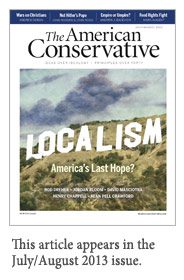Unlearning to Be Human

In 1896 the Anglo-Polish writer Joseph Conrad wrote a short story called “An Outpost of Progress.” It recalls the tragic fate of two traders—Kayerts and Carlier—who are sent by a Belgian corporation to a remote part of the Congo.
Afforded the luxury to buy local slaves to complete their physical work for them, the two men spend much of their days idle. Over the next few months their food supplies run out, and the ship they are expecting from Europe fails to arrive. In a quarrel over sugar rations, Carlier is the first man to die.
Witnessing the death of his colleague, Kayerts soon loses the will to go on. He hangs himself from a wooden cross, which was put there to mark the death of an earlier trader, who, the narrator tells us, had “watched the construction of this outpost of progress.”
If such a thing as a philosophical lesson can be gleaned from this short story, it is this: without the prospect of a future or a society to guide them in how to live, these men see no reason for existing. Faced with a choice between living without a purpose or death, both choose the latter.
As the story reaches its climax, Conrad juxtaposes an image of the steamer finally arriving from Europe just as Kayerts breathes his last hanging from the cross. But all is not lost, it seems. Kayerts finds the redemption in death that he could not find in life, while humanity—it appears—rolls onwards in the great march of progress, as the European settlers sail down the river.
While Conrad’s ideas about imperialism would today be considered racist, his thoughts on Christianity can be seen as a reflection of his suspicious attitude to progress. In a letter he wrote to the novelist and playwright John Galsworthy in 1901, Conrad declared, “Scepticism, the tonic of mind, the tonic of life, the agent of truth—way of art and salvation.”
It’s with admiration for Conrad’s antipathy to dogmatic principles that John Gray references this short story at the beginning of The Silence of Animals.
For Gray—emeritus professor of European thought at the London School of Economics—Conrad’s lucid prose is a reminder of how instrumental myth is in helping human beings cope with the existential ennui that is central to the human condition. As Gray eloquently puts it: “The power of myth is in making meaning from the wreckage of meaning.”
Conrad is one of many writers from the canon of modern literature that Gray references in this short polemic. Others include Ford Madox Ford, John Ashbery, Sigmund Freud, and Wallace Stevens. Gray interconnects abstract lines of poetry, memorable passages from some of the age’s finest writers, and insights from his favorite philosophers and thinkers—along with a number of his own aphorisms. Here are a few examples: “Humankind is, of course, not marching anywhere”; “There is only one human animal, forever at war with itself”; “To think of humans as freedom-loving, you must be ready to view nearly all of history as a mistake.”
When I began reading this book, it felt as if Gray was simply going over the same old ground, rehashing his mantra about the myth of progress, which goes something like this: history does not follow a linear pattern, mankind is not on a march to progress, and anyone who thinks otherwise is either a fundamentalist or slightly deluded. Yet while there is an element of this, The Silence of Animals offers a more nuanced approach.
Over his distinguished career, Gray has come to be seen as a cantankerous know-all by his enemies and as a genius by disciples who share his nihilist vision of the world. While to many he remains one of the most revered political theorists in contemporary Western philosophy, his opponents see him as a contrarian who refuses to nail his colors to the political mast.
Some of the intellectual giants he has learned from—on both the left and the right—he now regularly criticizes, including John Stuart Mill and Fredrick Hayek. (He has written acclaimed books about both.)
In the 1980s, Gray was an advocate for Thatcherite free-market principles. But as Tony Blair carried the Iron Lady’s ideology into New Labour’s successful 1997 election campaign, Gray swung left of center and gave up on the New Right.
This process of reassessing his own political and philosophical judgment is what makes him such an interesting critical thinker. While he has changed ideological clothes a number of times, there is one side of Gray that has been extremely consistent: his deep suspicion about massive projects for human freedom.
This is something he inherited from his intellectual hero, Isaiah Berlin.
The most dangerous man in the world, in Berlin’s humble opinion, is he who thinks he has discovered the true meaning of life, for such a character believes that an earthly paradise can be achieved in this divided world of ours.
What Gray takes from Berlin is the idea that every actor in each of these massive thought-projects has been convinced of his own infallibility. But, as history has proven, all have been mistaken. Lenin believed he had discovered—via Marx—the laws that governed history; Hitler was sure the Jews and the bourgeois were the root cause of all evil in the world. Francis Fukuyama was convinced that free-market capitalism would be the last phase in the evolution of the modern political system, while George W. Bush was certain that liberal democracy—however it was achieved—would be the West’s gift to those countries that hadn’t quite figured out how the process of government worked.
The argument doesn’t end with the discipline of politics, either.
For rational atheists like Richard Dawkins, Sam Harris, and the late Christopher Hitchens, the world will magically transform itself into a coherent place if we just embrace science and reason.
Another of Gray’s habits is to take two seemingly opposite ideologies and show how they are similar. In Al-Qaeda and What it Means to be Modern, Gray argued quite convincingly that the neoconservative movement and fundamentalist Islam were cut from the same cloth: both are apocalyptic myths of utopian hope that stem from the Jacobin principle of revolution and progress.
Almost every major political ideology we have been exposed to in the last hundred years, Gray posits, is a product of Enlightenment thinking, and if we want to trace the trajectory of the Enlightenment idea of progress back to its sources, we must go back to ancient Greece and the early days of Christianity. Gray writes:
Mixing a Greek idea of reason as giving access to timeless truths with a Christian view of salvation in history has not produced anything like a coherent synthesis; but the resulting humanism—secular and religious—has formed the central western tradition.
Sometimes such grand declarations feel like Gray is stating that nothing matters, so contemplating a notion of a brighter tomorrow is a waste of time. But within this black hole of despair, a white light emerges, if one allows some time for Gray’s argument to ferment.
 When it comes to ontology, Gray’s guru is Sigmund Freud. For it was Freud who understood that human beings are constantly at war with their own reflections and in a state of perpetual discontent. Put simply: it’s part of the human condition to wonder why you exist and what your purpose of being is. But answering that is a war no human being is ever going to win. Freud believed the only way out of this conundrum was to deal with life through metaphors and myth.
When it comes to ontology, Gray’s guru is Sigmund Freud. For it was Freud who understood that human beings are constantly at war with their own reflections and in a state of perpetual discontent. Put simply: it’s part of the human condition to wonder why you exist and what your purpose of being is. But answering that is a war no human being is ever going to win. Freud believed the only way out of this conundrum was to deal with life through metaphors and myth.
As Gray puts it: “Freud’s mythology captures features of human experience that are enduring and universal. Of course [these] ideas are systems of metaphors … so is all human discourse, even if metaphors are not all of one kind.”
In Gray’s worldview, the great enemy of all philosophical thought is certainty. Human beings are the only animals who have equipped themselves with symbols to help make sense of an existence they cannot understand. They have a tendency, says Gray, to think and act as if these symbols actually exist. Much of philosophy and religion—particularly in a Western context—Gray contends, “is not much more than a rationalization of this conceit.”
If human beings want to attain inner peace, they could learn a thing or two from the animal kingdom. To illustrate this point, Gray recalls a story of a bird watcher from Essex in South East England called J.A. Baker. In a book he wrote called The Peregrine, Baker described how he obsessively followed this bird for a period of ten years. His hope was to shed his human identity and become the bird. The horror that Baker was fleeing from, says Gray, was a “world in which humans encountered only reflections of themselves.”
If the human mind is ever to escape the various myths that make up our lives, it must be through small moments of what Gray calls “Godless contemplation.” What this offers, he explains, is “mere being.” Gray believes, as the book’s title suggests, that “the silence of animals”—who don’t share our capacity of language to construct meaning—is something that everyone should strive for.
This is perhaps Gray’s least controversial book to date, but it’s up there with the best that he has written. Gray would admit that his own thesis isn’t infallible. In fact, one suspects he prefers people to read his books with a critical eye—as another great English philosopher, Bertrand Russell, once commented, “When a man tells you that he knows the exact truth about anything, you are safe in inferring that he is an inexact man.”
J.P. O’Malley is an Irish writer living in London.
Comments